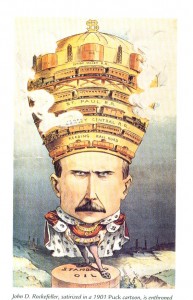CEOs Earn More When They Fire People
 The Institute for Policy Studies has just released their 17th annual review of CEO salary. It makes for scary reading.
While the rest of us suffer through the double-dip-recession-that-never-actually-lifted-off-the-bottom, CEOs, who are not only some of the wealthiest people in the country but are also the most handsomely paid to boot, have seen their income rise in real terms, while their employees have seen a reduction in real income and a significant contraction of job opportunities.
According to the Institute
The Institute for Policy Studies has just released their 17th annual review of CEO salary. It makes for scary reading.
While the rest of us suffer through the double-dip-recession-that-never-actually-lifted-off-the-bottom, CEOs, who are not only some of the wealthiest people in the country but are also the most handsomely paid to boot, have seen their income rise in real terms, while their employees have seen a reduction in real income and a significant contraction of job opportunities.
According to the Institute
Corporate executives, in reality, are not suffering at all. Their pay, to be sure, dipped on average in 2009 from 2008 levels, just as their pay in 2008, the first Great Recession year, dipped somewhat from 2007. But executive pay overall remains far above inflationadjusted levels of years past. In fact, after adjusting for inflation, CEO pay in 2009 more than doubled the CEO pay average for the decade of the 1990s, more than quadrupled the CEO pay average for the 1980s, and ran approximately eight times the CEO average for all the decades of the mid-20th century.Their employees, meanwhile
are taking home less in real weekly wages than they took home in the 1970s. Back in those years, precious few top executives made over 30 times what their workers made. In 2009, we calculate in the 17th annual Executive Excess, CEOs of major U.S. corporations averaged 263 times the average compensation of American workers. CEOs are clearly not hurting.But reality is even worse:
In 2009, the CEOs who slashed their payrolls the deepest took home 42 percent more compensation than the year’s chief executive pay average for S&P 500 companiesThe market, and the embedded compensation committees, are rewarding CEOs for destroying livliehoods, for shipping jobs overseas, and for eviscerating the american workplace. These are the same people who lobby our politicians to create business friendly legislation (aka legislation that will protect their bonuses and options) and to fight against social programs (that would level the playing field a little) What was so wrong with the vibrant, growing, energetic America of the 70s and 80s? Why do CEOs hate America, so?




